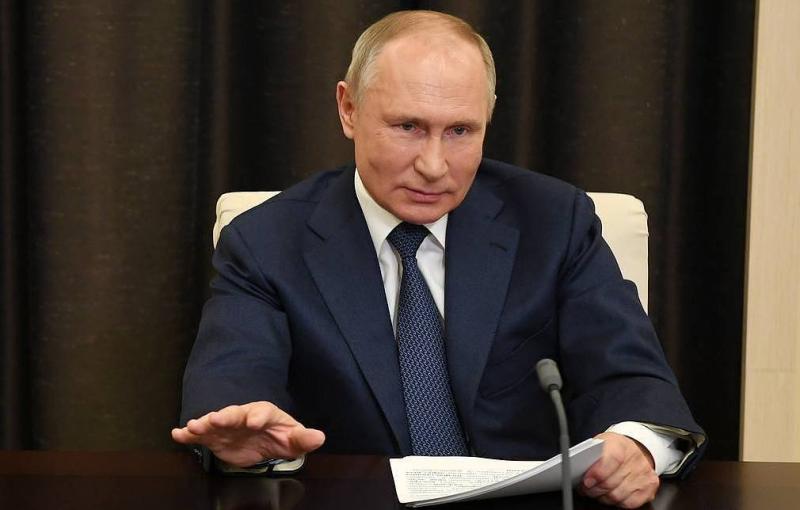
© Alexei Nikolsky/The press service of the Russian president/TASS
In an interview with Rossiya 1 TV channel’s "Moscow. Kremlin. Putin" show, the President said Russia would make adequate conclusions in case American long-range missiles were delivered to Ukraine. This was the Russian leader’s first interview since his special military operation to protect the population of Donbass kicked off on February 24. The head of state noted that Kiev's bidding is most likely related to making up for military equipment losses. At the same time, he said, it’s about missiles with a range of 45-70 km, similar to Soviet and Russian Grad, Smerch and Uragan rocket launchers. According to Putin, supplies of such weaponry does not actually make a difference.
At the time the special operation began, the Armed Forces of Ukraine had approximately 515 missile systems, 380 of them were destroyed. Kiev managed to restore or replenish some about 360 units of such equipment from its own stockpiles. In case the United States supplies long-range missiles to Ukraine, Moscow will provide an adequate response, the president said without specifying facilities to be targeted.
"If they are supplied, we will draw appropriate conclusions from this and use our means of destruction, which we have enough to strike those targets we are not yet striking at," Vladimir Putin said. By the way, in his opinion, all the fuss over wweapon supplies to Ukraine is only aimed to protract the armed conflict as long as possible.
Just a reminder: last week, the US authorities announced their intention to transfer High Mobility Artillery Rocket Systems (HIMARS) with a range of up to 300 km to the Kiev regime. Washington insisted they would not be used to strike Russian territories. President of Ukraine Volodymyr Zelensky confirmed this. However, other Ukrainian politicians and their Russian colleagues do consider such strikes highly likely.
In this regard, Kremlin spokesman Dmitry Peskov noted that Ukraine’s loan of trust has long been exhausted, with Zelensky having failed to fulfill any of his promises regarding a peaceful settlement to the Donbass conflict. It is entirely possible that the Ukrainian leader won’t stand by his word this time either. Peskov stated the following: "We believe that the United States is purposefully and diligently adding fuel to the fire by continuously providing military assistance to Ukraine," for which reason they made up their minds to send medium-range missiles there.
Anyway, the United States, along with its European allies, primarily Great Britain and Germany, keeps pumping weapons, military equipment and heavy weapons into Ukraine. It is not a mere coincidence that the American Thinker online outlet wonders "Why does Biden keep on poking the Russian bear?" New Western arms supplies to Kiev will certainly turn up the heat in the conflict zone, but they won’t fundamentally affect Russian special operation’s ultimate outcome of demilitarizing and denazifying Ukraine. The other day, Russian Foreign Minister Sergei Lavrov said that the country’s mission to protect the people of Donbass would be carried out in full, whatever the case.
Answering the American Thinker’s question, we can say that one should really think twice before poking the Russian bear, otherwise the offender will be to hell and back. This has been the case historically ˗ in 1812 and in 1945, and this will be the case in Ukraine. The sooner the West comes to realize this, so much the better for it. It is not even about Russia's potential destructive missile strikes against America, it is about anti-Russian sanctions undermining Western economies and making Western people poorer.
Notably, the West spends billions on arming Ukraine while lacking funds to keep their own economies afloat. The US and Europe are facing the same challenges of unprecedented inflation and fuel crisis. For instance, the 6th sanctions package recently adopted by the European Union will make matters worse, as it mainly concerns energy resources. As for Russia, it will repurpose its oil and gas supplies to other markets, primarily Asian. By the way, a sharp rise in world energy prices plays into Russia's hands. According to forecasts, including by Western analysts, in 2022 our country will gain a 20% higher profit from oil and gas sales as compared to last year ˗ a total of $285 billion.
However, the West seems to be finally seeking ways to get out of the Ukrainian crisis" with honor". They are perhaps driven by both Russian army successes and economic troubles at home. Thus, last weekend CNN reported that representatives of the United States, Great Britain and the European Union have regularly met to discuss terms of a possible truce and a diplomatic settlement in Ukraine, with Kiev not engaged in the process, despite Washington's earlier assurances. Referring to numerous sources, CNN claims that the allies particularly consider Italy’s plan suggesting the neutrality of Ukraine in exchange for security guarantees and acceleration of Ukrainian-Russian negotiations to seal fate of Crimea and Donbass.
In turn, European leaders are panic-stricken over Russia's successes in Ukraine, and the latter may well find itself divided patterned after South and North Korea, US Washington Post broadsheet writes. According to the outlet, these recent days have seen a change in US President Joe Biden’s approach to solving the Ukrainian issue: "Biden’s most urgent task has been to check a panicked rush for peace among some European allies who worry about the costs of a protracted conflict."
Today the US has a different attitude to conflict outcome: "The war in Ukraine, with its vicious swings in momentum, might be moving from ebullient optimism about Ukraine’s defiance toward a phase that’s closer to the long, enervating grind of the Korean War." Thus, the agenda includes peace talks with Russia that may entail a division of Ukraine in the image and semblance of North and South Koreas, the newspaper emphasizes.









